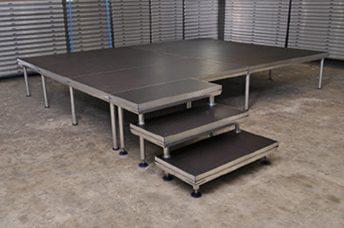ALS Decor LTD
Event Staging Rental
Event Staging Rental
Couldn't load pickup availability
Size 3 meters by 2 meters with stairs
Stage hire typically refers to the process of renting a stage for various events, performances, or presentations. Whether it's a live concert, theater production, corporate event, wedding, or any other gathering where a stage is needed, stage hire services provide the necessary equipment and infrastructure to create a platform for performers or speakers. Here's a description of what stage hire entails:
Description:
1. Stage Selection: Stage hire begins with selecting the appropriate type and size of stage based on the specific requirements of the event. Stages come in various configurations, including indoor and outdoor options, different dimensions, and stage designs to suit the event's aesthetics and functional needs.
2. Equipment: Stage hire typically includes the rental of essential equipment such as stage platforms, stairs, handrails, skirting, and safety features like guardrails and fire-resistant materials. Lighting and sound equipment can also be part of the package, depending on the provider.
3. Installation: A professional stage hire company will handle the installation and setup of the stage. This involves ensuring the stage is level, stable, and safe for performers and event attendees. The installation team will also consider factors like weather conditions for outdoor stages.
4. Customization: Depending on the event, stages may need customization with branding elements, backdrops, or special features like trap doors or lifts. Stage hire providers often offer customization options to meet the event's unique requirements.
5. Safety: Safety is a top priority when it comes to stage hire. The stage must meet all safety standards and regulations to protect both performers and the audience. This includes proper load-bearing capacity, secure anchoring, and adherence to fire safety codes.
6. Technical Support: Many stage hire companies offer technical support, which includes on-site technicians to manage and troubleshoot lighting, sound, and other technical aspects during the event.
7. Dismantling and Removal: After the event concludes, the stage hire company will dismantle and remove the stage and equipment efficiently. Proper care is taken to leave the venue in the same condition it was found, ensuring no damage is done during the removal process.
8. Logistics and Transportation: The stage hire provider is responsible for transporting all the necessary equipment to the event location. They should also have a logistics plan to ensure the equipment arrives on time and is set up promptly.
9. Cost and Payment: The cost of stage hire varies based on factors such as stage size, duration of use, customization, and additional equipment needs. Payment terms and arrangements are typically discussed and agreed upon in advance.
10. Booking and Planning: To secure stage hire services, event organizers need to book well in advance, especially for high-demand dates. Adequate planning and coordination with the stage hire company are essential to ensure a seamless event.
In summary, stage hire is a comprehensive service that provides event organizers with the necessary infrastructure to create a platform for performances or presentations. It encompasses stage selection, equipment provision, installation, customization, safety measures, technical support, and efficient setup and removal, all tailored to meet the specific needs of the event.
FOR OTHER PARTY ITEMS or MORE PICTURES & VIDEOS
Tel number: 02030624000
WHATSAPP: +44 7940724177


 ALS Decor Ltd
ALS Decor Ltd
